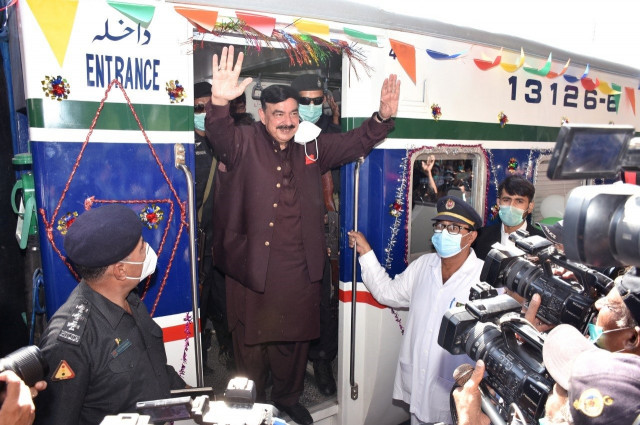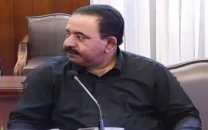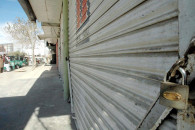After 21 years, Karachi Circular Railway begins partial operations
Railways minister kicks off revival as a 'gift for Karachiites'; officials fear technical woes may doom project

After being out of commission for 21 years, the Karachi Circular Railway (KCR) began partial operations on Thursday over a cleared 14-kilometre stretch of its old route.
But as Railways Minister Sheikh Rasheed celebrated the development as a 'gift for Karachiites', experts and officials voiced concerns about whether the latest attempt to revive the mass transit service is doomed from the get-go.
The KCR revival project, in its present form, covers a 44km route that includes a 30km loop with 20 stations and 14km main line with five stations. Thursday's inauguration focused on the first of three phases, which will see trains run back and forth along a 14km track between Karachi City Station and Orangi Station.
The second phase will expand operations to a seven-kilometre track running from Orangi Station to Gilani Station, while the third will see trains running over a nine-kilometre stretch between Gilani Station and Drigh Colony.
As he inaugurated the first phase, the railways minister said the new KCR project would be completed in two-and-a-half years. "It will be our gift to the people of Karachi," Rasheed announced, as he hit back against a "powerful land mafia that had usurped KCR land."
Addressing the troublesome and delay-plagued process to get the circular railway up and running, Rasheed said the railways ministry was not getting the political support it needed to reclaim the land. Even so, he credited the revival to Chief Justice of Pakistan Gulzar Ahmed as well as the efforts of Prime Minister Imran Khan, the Sindh government and the workers of Pakistan Railways.
"All credit goes to the Chief Justice of Pakistan who gave special attention to this long-delayed project," the minister told reporters, adding, "I am a friend and a member of PM Imran's cabinet... [and I am] implementing the Supreme Court's orders with complete honestly." Rasheed also said that his ministry was cooperating fully with the Sindh government.
Speaking to a news channel later in the day, the minister also voiced confidence that the new KCR would be prove to be 'more modern' than Lahore's Orange Line train.
Full speed ahead?
While inaugurating the project, Rasheed proudly announced that with no crossings in the route, the new KCR would run at a speed of 60km per hour.
However, speaking to The Express Tribune, mass transit experts said that in its present form, it was unlikely that trains would be able to gather full speed.
The main technical issue, according to them, concerned the gauge of rails being used for the KCR. Intra-city transit systems the world over usually employ a combination of trains running over standard gauge and light rail, and feeder buses, they said.
The KCR track, however, uses broad gauge, which is only suitable for heavier locomotives and long-distance travel. Trains running over broad gauge speed up gradually, experts pointed out. As such, they are feasible when there is considerable distance between stations, which allows the trains to hold top speed for longer travel duration. In cities, since stations are situated closer to each other, it is impossible for broad gauge trains to run full steam, they added.
Coupled with the lack of feeder buses, experts said this would make a KCR commute excruciatingly long for consumers. Running trains over broad gauge will also increase operational costs, they pointed out.
Avoiding contempt
Speaking to The Express Tribune on condition of anonymity, sources associated with the project said the authorities are already aware of these potential issues. "Top Pakistan Railways officials are well aware of this, but they want to avoid contempt of court," a Sindh Transport Department official claimed.
"The Supreme Court ordered the restoration of KCR a year-and-a-half ago, but Pakistan Railways took no concrete steps," he said. "Now, they are going about it in an ad-hoc fashion, which will doom the project to failure before it starts and cost a lot of money in the process."
Other officials also pointed out that the first phase of KCR only focuses on the main line, which was unaffected by encroachment. "Trains already use this track for inter-city travel," one official said. "The main issue with reviving KCR is the remaining 44km, which now lies in the midst of densely populated areas."
(WITH ADDITIONAL INFORMATION FROM OUR CORRESPONDENTS IN KARACHI AND AGENCIES)



















COMMENTS
Comments are moderated and generally will be posted if they are on-topic and not abusive.
For more information, please see our Comments FAQ